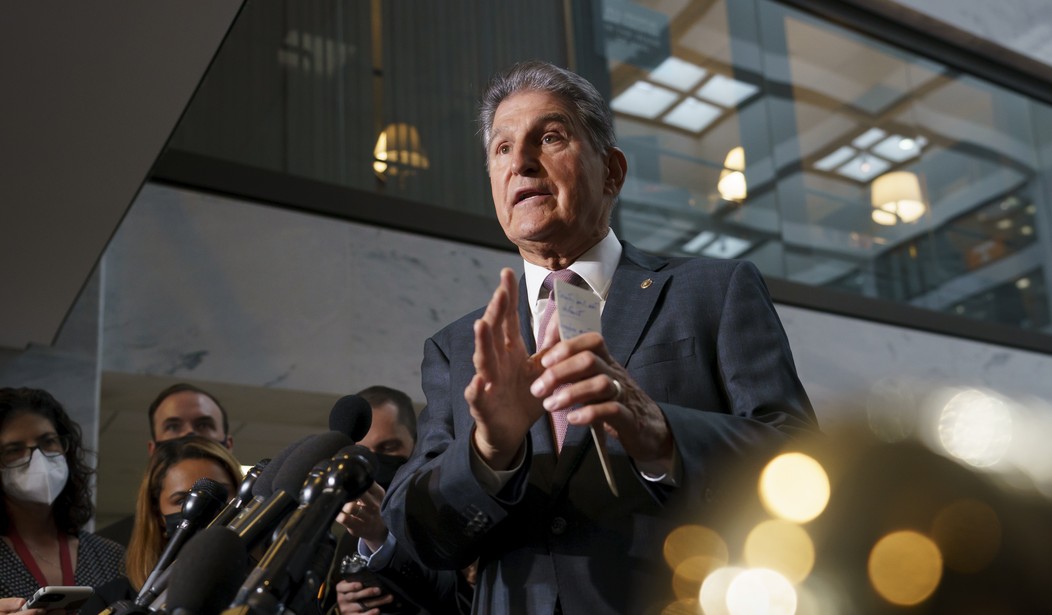While Sen. Joe Manchin (D-WV) made it clear he is not in favor of the nuclear option to get rid of the filibuster, he and other Republican senators did recently confirm to The Hill that he is in talks with GOP members to discuss reforming it. Jordain Carney first reported on the scoop on Wednesday for The Hill. Manchin emphasized that any reform "should be bipartisan," ruling out the nuclear option.
It's worth noting that Carney begins his piece by writing that Manchin is "a key Democratic holdout on reforming the filibuster," indicating that his idea of "reforming the filibuster" means getting rid of it. Carney goes on to write that Manchin is "discussing small changes to Senate rules with Republicans."
Manchin has been having conversations with key members as confirmed by them, including Sen. John Thune (R-SD), who is the Senate Minority Whip, and Sen. Roy Blunt (R-MO), who chairs the Senate Republican Policy Committee:
“Most of us would argue that the only thing that it takes to get the Senate working better is behavioral change. … But he is trying to come up with some fairly, I would say, creative ideas about the rules,” said Sen. John Thune (S.D.), the No. 2 Senate Republican.
Thune added that Manchin had spoken with other GOP senators and that there was a “considerable amount of interest in trying to make the Senate functional.”
Sen. Roy Blunt (R-Mo.) confirmed that Manchin had also talked to him.
“You know I had a lot of discussions with Schumer on this topic when he was the ranking member on Rules and I was the chairman and we could reopen that discussion," he added, referring to Senate Majority Leader Charles Schumer (D-N.Y.).
The idea in mind seems to be about making it easier to get bills brought to and passed on the Senate floor:
Recommended
“I’ve been talking to Republicans and Democrats, how do we make the place work, so we can treat each other like human beings and try to get something accomplished and do the job we are supposed to do,” Manchin said.
Manchin added that they were talking about “any rules that would basically help this place work.”
...
“There’s been casual discussions for some time,” Sen. Mike Rounds (R-S.D.) told The Hill. “There aren’t that many things that they expect us to get done every single year, but we should be in a position to get those things done in a timely fashion.”
“I think there’s a lot of us that feel that way,” Rounds added about the frustration over the gridlock.
However, it could very well be a tactic from Manchin to get Democrats off of his back:
Thune floated that Manchin’s talks could be a back channel effort to dial down pressure on Democrats to make changes to the filibuster.
“I think part of maybe his motivation too is just to take the pressure off of that and if we could get some things done that would make it more conducive to accomplishment then he wouldn’t feel, and others wouldn't feel, as much pressure to nuke the filibuster,” Thune said.
Carney also mentioned discussions from Democrats for reform, which involve Sens. Tim Kaine (D-VA) and Jon Tester (D-MT). It's separate from Manchin's discussions. One of their ideas includes requiring 41 "no" votes to block legislation rather than 60 "yes" votes to advance it.
President Joe Biden has been vague on taking a position on this issue, as he has been on other key issues. He has, however, come out in support of implementing a talking filibuster, which is one Democratic-discussed reform included in Carney's report.
It's worth repeating, though, that Manchin emphasized "it should be bipartisan," meaning he would almost certainly be opposed to the above ideas if no Republicans were willing to agree to them.
Carney also omits a key point about filibuster changes, particularly when it comes to judicial nominees [emphasis added]:
To change the rules with bipartisan support, senators typically need 67 votes. Republicans previously floated that they could make changes to how the Senate handles nominations with just 60 votes, though they ultimately invoked the “nuclear option” to force the changes through without Democratic support.
Democrats were the first to get rid of the filibuster for judicial nominees, under then-Senate Majority Leader Harry Reid (D-NV). When invoking the nuclear option for Supreme Court nominees, the succeeding leader, then-Senate Majority Leader Mitch McConnell (R-KY), was merely following what Reid had done, something McConnell had warned him not to do.
There is hardly any mention of Sen. Kyrsten Sinema (D-AZ), the other Democrat who opposes getting rid of the filibuster, except to indicate that that is her position.
We're not going to save American democracy by cutting deals with a party that doesn't want to save it.
— Demand Justice #ExpandTheCourt (@WeDemandJustice) May 28, 2021
Abolish the filibuster.
Pass HR 1 and the John Lewis Voting Rights Act.
Make D.C. a state.
Expand the Supreme Court.
Those demanding that the Senate get rid of the filibuster have been particularly relentless. Also, some claim it is necessary to "save democracy," exercising their forgetfulness that the Senate is supposed to be the less democratic body of Congress. Senators weren't even directly elected until 1913, through the 17th amendment.
The Senate on Thursday had voted 59-34 to pass legislation that would do away with the filibuster for the specific purpose of voting to raise the debt ceiling with a simple majority.
























Join the conversation as a VIP Member